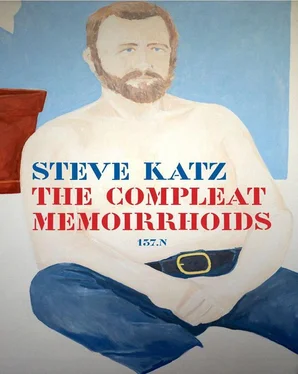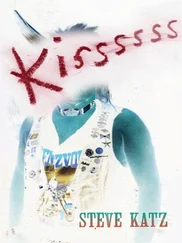Not even Bob Cornfield has shown up for this party. I wander among the suits and ties, trying to bubble up some conversation. I keep thinking that someone else is supposed to be here, not me, but my double, my other guy from somewhere who knows how to work the room. That other should be leaning against this sideboard, tipping a drink into his mouth. Someone as smart and conversational as Frank O’Hara could be enjoying the shit out of this event. Chris Cerf graciously introduces me to various luminaries who have appeared for the party to celebrate Peter Prince. Am I this writer? Is this my book?
So somehow I’m traded to Random House. Chris Cerf loves the work, thinks I should be put in cohoots with his Harvard buddies at National Lampoon, but they have little interest in anyone outside their Harvard circle. Random House does Creamy and Delicious , and I make some stupid temperamental mistakes. I have approval of the jacket. Just because I can I reject a terrific cover they have designed and insist on a dreary idea I have for a monotonous whipped cream effect with the title printed over. I reject their offering of fun graphic responses to my works in favor of my lame concept, just to flex some stupid muscle.
The first few boxes that come out of the bindery have my cover wrapped around the text of Elie Weisel’s A Beggar In Jerusalem . These first books get shipped to reviewers, so because of this confusion reviews are sparse. I’d got the title from a sign in Yonah Shimmel’s knishery on Houston Street — Try Our Borscht, Creamy and Delicious . I go downtown and show them the book. The boss looks at it disparagingly and asks if I talk about the restaurant in my book. When I tell him I don’t he shrugs and turns away, saying, “So what’s the use?” I sit down under the sign and get a dependably comforting kasha knish to weigh me down, and a glass of sour milk. When I finally meet Elie Weisel in South Bend, Indiana, and give him a copy of our crossed books, not even a chuckle from him, not even a conversation.
So I am here at this party to celebrate the books people insist I have written. Dylan’s song runs through my mind, “It’s Ain’t Me, Babe.” Crumb is gone. The conversations converge into a river of noise. “Not me you’re lookin’ for, Babe.” I slip past various well-dressed smiling creatures, nod at Chris Cerf, and slip out the door, into the long New York City apartment hallway, and wait for the elevator, hoping it gets there before someone catches me and pulls me back. I descend into the street where the party called New York City goes on all the time, and in its anonymous crawl and dim celebrations, in the comfort of its surprises, I feel the ease and mystery I want to play through my work.
The compressor is too noisy so they shut it off before you read. These twelve foot high pink and white inflatable bunnies slowly flatten. When inflated they are some terrifying bunnies. Once deflated they are easy to stomp on. They belong to the Dikeou Collection of contemporary art in Denver, Colorado, occupy two corners of the room in which the readings happen. The wind of their deflation carries no words, but once they are deflated, at the podium the writers read their works between two flat bunnies. If I am ever on the road again I would like to take these two inflatables as companions and release my words into the rabbit wind as they wilt.
At the University of Oklahoma once I was paid $2000 to read to an audience of six people, nice people who told me how their anti-war movement had been betrayed by a faux hippy agitator who instigated riots in 1968. On the night following my reading Czeslaw Milosz received the $20,000 Lannan Prize at a large auditorium before an audience of eight besides myself and three of the six from my crowd. Two of the aged Lannan dedicators slept as the Polish poet read. The wind of their snoring was rabbit wind.
In Halifax once I read at a benefit for the Buddhist community many of whom had recently moved to Nova Scotia from Colorado. I was performing with Phil Glass. We both came down to Halifax from Inverness in Cape Breton. The large auditorium was packed with Haligonians, Buddhists, and tourists, most of them there to hear Phil. I read my story called “One Pinch Plut,” which was a much longer read than I had anticipated. When you read prose, it tends to go on until the end. I carried much of the audience through the whole piece, but could sense that many of them wanted me to give way to Phil. For that part of the audience I was all rabbit wind, and the rabbit was deflating too slowly. On the other hand, I thought it would be great to follow Phil everywhere and read to his big audiences, laying a pavement of rabbit wind for his serial music.
The act of performing my works, of reading them aloud, has always added another layer of insecurity to the bright garment of self doubt that makes acts of writing unnerving and vital. When I was a student editor of Epoch magazine the faculty editors wouldn’t let me me read the works I advocated aloud because my readings were too convincing and somehow unfair. I have long grappled with my talent for hamming up a poem. It always confuses me when I read my own work aloud, and grab the attention of the audience by moving them or making them laugh. Is it the quality of the work or the seduction of the performance? This is part of the imponderable quandariness of a life committed to art. People tell me that they are glad to hear me read, that it makes them appreciate the work more. I enjoy the attention and approbation, but always wonder if the work plays as well on the page without the wind of the rabbit. I know that many people take pleasure in reading aloud to themselves. Perhaps my reading helps their process. I enjoy my “dramatic” skills, but I always have the fear that the real attraction may be in the performance, not in the work where I want it to perform by itself, as language alive on the page. Thinking about this is like trying to watch yourself dance. Any glance in the mirror changes the moves. It feels to me a weak diversionary tactic to call my readings “performance,” that great academic whoops of contemporary art.
When Antonello’s Lion was released, Rafael, my son, booked some readings around Portland, Oregon. I read to a nice crowd at Clackamas Community College, then at the very precious Reed College. An old friend from Eugene and the Northwest Review , whom I hadn’t seen for years, who taught philosophy there, Robert Paul, the most soft spoken philosopher in the universe, whispered an introduction. His was a quietly snide introduction, correctly measuring the hubris and pretensions he drew from my lame entry in the Contemporary Authors Autobiography Series . I don’t think anyone heard him. The last reading was at a small resort and vineyard called McMenamin’s Edgefield, a popular watering hole outside Portland, a retreat for people with family or lover. They offer a panoply of activities and games. They had never before presented the attraction of a living author reading from his work, and probably never will again. They brought in fifty copies of the book for me to sign, and them to sell. Obviously they were novices in the book business. For my troubles they gave me a small honorarium and treated myself and Rafael to dinner at their popular roast beef restaurant. It was the time of vendemmia, the grape harvest. They had set me up in a room in their cellar, near the barrels they were filling from fresh pressings of grapes. Guests passed and peeked in to see me at the podium, then moved on to badminton or tango lessons. A few people sat down. Fruit flies ruled the air of the room. Every time I opened my mouth they flew in, checking out anything moist. I was a slave of the flies. The people, some of them perhaps at their first reading ever, witnessed an author who when he opened his mouth to read off the page, immediately breathed in squadrons of flies. I tried to keep my teeth clenched to sift them out, but they wandered across my incisors and did their stunts on the moisture of my lips. So the McMenamin’s guests who stayed witnessed the author of Antonello’s Lion as a swallower and sputterer of fruit flies. Even now, as my bones deteriorate into old age, I occasionally feel the release of a tardy McMenamin fruit fly into the remnants of a rabbit wind.
Читать дальше












